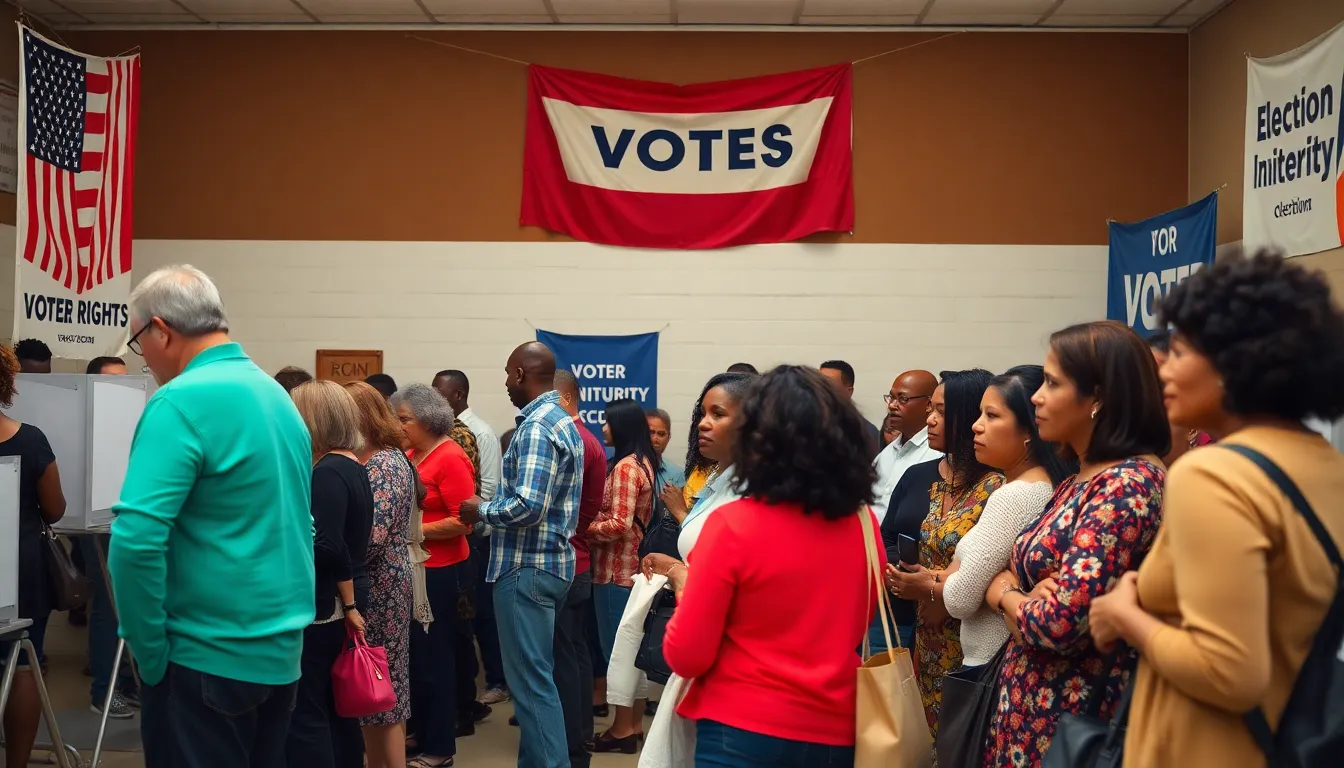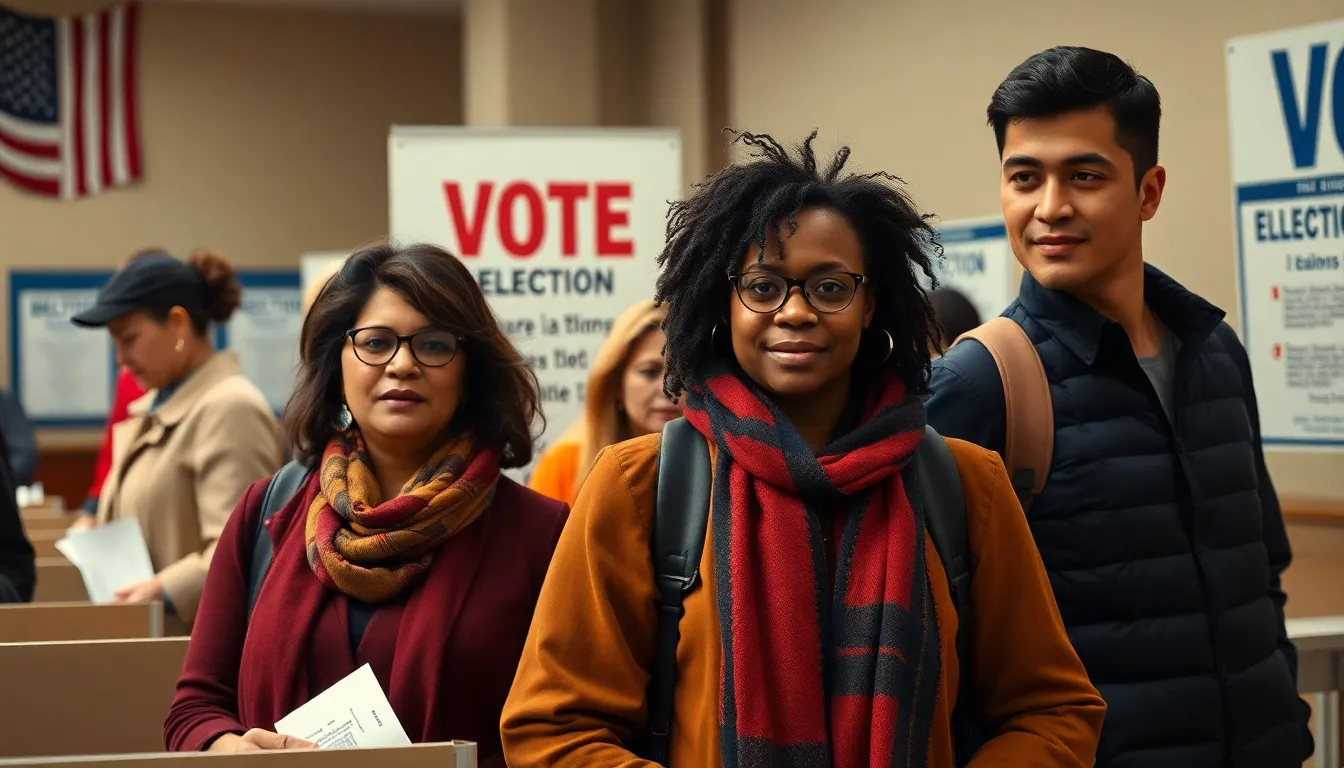Election regulations might sound as thrilling as watching paint dry, but they’re the unsung heroes of democracy. These rules ensure that every vote counts and that candidates play fair. Without them, elections could turn into a chaotic free-for-all, where the loudest voice or the shiniest campaign ad wins.
Understanding these regulations is like knowing the rules of a game before you play. It keeps everyone on the same page and prevents any unexpected surprises—no one wants to find out their favorite candidate has been disqualified for a technicality! So buckle up as we dive into the fascinating world of election regulations, where the stakes are high and the rules are crucial for a fair and just electoral process.
Table of Contents
ToggleOverview Of Election Regulations
Election regulations provide the framework governing electoral processes. They include laws and procedures established to ensure fairness, transparency, and integrity during elections. Various aspects of these regulations encompass voter eligibility, campaign financing, and poll management.
Fair voter eligibility criteria define who can participate in elections. Regulations generally specify age, residency, and citizenship requirements. Many states enforce registration deadlines to ensure that only eligible voters cast ballots.
Regulations concerning campaign financing focus on limiting contributions and expenditures. They mandate disclosure of funding sources, promoting transparency in political financing. Such rules aim to reduce the influence of money in politics, ensuring a level playing field for candidates.
Poll management regulations dictate how polling places operate. They include guidelines for ballot design, voter assistance, and counting procedures. Ensuring compliance with these rules prevents discrepancies in the electoral outcome.
Monitoring and enforcement mechanisms hold participants accountable. Election commissions oversee compliance with both state and federal regulations. Violations of these laws can lead to penalties, including fines and disqualification of candidates.
At the federal level, the Federal Election Commission (FEC) oversees campaign finance laws. Similarly, state election offices manage regulations specific to their jurisdictions. Legal frameworks protect the integrity of elections and safeguard public confidence in the electoral process.
Understanding the nuances of election regulations proves essential for candidates and voters alike. Engaging with these rules fosters an informed electorate that can participate effectively in democracy.
Importance Of Election Regulations

Election regulations play a vital role in upholding democratic values. These rules ensure that the electoral process remains transparent and disciplined.
Ensuring Fairness
Fairness stems from regulations that govern elections, making sure that each candidate competes on equal footing. Regulations define clear standards and procedures that candidates must follow, reducing potential biases. Applying these rules minimizes disputes over electoral outcomes, leading to more accepted results. Transparency in practices cultivates trust among voters and candidates alike, as everyone understands the framework governing their participation. Reliable election processes depend on a consistent application of these regulations.
Protecting Voter Rights
Voter rights receive significant protection through effective election regulations. Establishing eligibility criteria helps ensure that only qualified individuals participate in elections. Safeguards against voter suppression become essential as well, with regulations preventing tactics that might disenfranchise eligible voters. Voter accessibility initiatives further support this goal, enabling individuals from different backgrounds to cast their ballots. Regulations also ensure that voters receive accurate information about their rights, empowering them in the electoral process. Thus, protecting voter rights directly contributes to a healthier democracy.
Key Components Of Election Regulations
Election regulations consist of several fundamental components that shape the electoral landscape. These elements promote fairness, transparency, and accountability.
Voter Registration
Voter registration guidelines establish the criteria for eligible voters. Age, residency, and citizenship status play crucial roles in determining who can cast a ballot. Many states mandate that individuals register a specific number of days before an election, ensuring adequate preparation for voter participation. Various methods of registration exist, such as online, mail-in, and in-person options, making it easier for eligible voters to register. Continual updates to registration databases help maintain accurate voter rolls, which is vital for minimizing fraud.
Ballot Design And Distribution
Ballot design and distribution standards ensure clarity and accessibility for all voters. Regulations require ballots to be straightforward, with clear instructions and identifiable candidate names. Various formats, including paper and electronic ballots, accommodate different voter preferences. Additionally, jurisdictions implement rules on how and when ballots must be distributed, often allowing early voting and absentee voting. Security measures, such as unique ballot codes, protect the integrity of the voting process.
Election Day Procedures
Election day procedures encompass a range of practices designed to facilitate a smooth voting experience. Polling places adhere to specific operational hours and accessibility requirements. Election officials must be well-trained to assist voters and address concerns that arise during the voting process. Voter identification requirements differ by state, impacting the documents voters present at the polls. Maintaining order at polling locations enhances the efficiency of the election process, ensuring that every individual has the opportunity to vote without unnecessary complications.
Challenges In Implementing Election Regulations
Challenges in implementing election regulations include voter suppression and legal disputes that hinder the electoral process.
Voter Suppression
Voter suppression remains a significant issue affecting many elections. This tactic manifests through strict voter ID laws that can disenfranchise eligible voters. Many communities face barriers created by limited access to polling places and registration difficulties. Instances of misinformation about voting procedures can also deter participation. Further complications arise in states with inadequate resources for voter education and assistance programs. These challenges create disparities, leading to unequal voting opportunities across different demographics.
Legal Disputes
Legal disputes often arise during elections, complicating the implementation of regulations. Candidates or parties may challenge the outcome based on alleged irregularities, creating a climate of uncertainty. Courts frequently handle cases regarding voter eligibility, district boundaries, and recounts. These disputes can prolong election results, affecting public trust in the process. Additionally, conflicting state and federal regulations contribute to confusion, complicating enforcement. The legal landscape surrounding elections requires continuous monitoring to ensure adherence to laws and protect voter rights.
Recent Changes In Election Regulations
Recent updates in election regulations reflect ongoing efforts to enhance election integrity and accessibility. These changes occur at both state and federal levels, responding to evolving electoral challenges.
State-Level Reforms
Many states have initiated reforms that aim to streamline voter registration processes and expand early voting options. For instance, several states have adopted automatic voter registration systems that increase participation while reducing administrative burdens. Additionally, some legislatures passed laws permitting same-day registration, allowing eligible voters to register and vote on the same day. These reforms demonstrate a commitment to improving accessibility for diverse populations, ensuring all voices are heard in the electoral process.
Federal Legislation
On the federal level, recent initiatives focus on enhancing transparency in campaign financing and protecting voter rights. The introduction of the Freedom to Vote Act seeks to standardize voter registration and voting procedures across states. Such measures aim to address inconsistencies that can confuse voters and diminish participation. Furthermore, provisions included in the bill call for limits on partisan gerrymandering, promoting fair representation. These legislative efforts underscore a push for reforms that foster equitable electoral conditions nationwide.
Election regulations are crucial for a functioning democracy. They establish a framework that promotes fairness and transparency in the electoral process. By ensuring every vote is counted and candidates follow established rules, these regulations protect the integrity of elections.
As the political landscape evolves, ongoing reforms aim to enhance accessibility and safeguard voter rights. It’s essential for both voters and candidates to stay informed about these regulations to navigate the electoral system effectively. A well-informed electorate is key to fostering a vibrant democracy where every individual can participate meaningfully.




